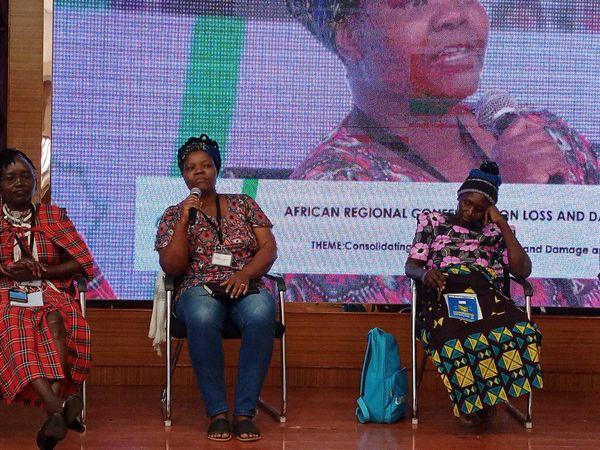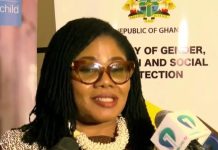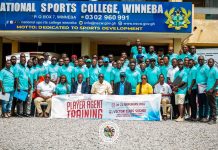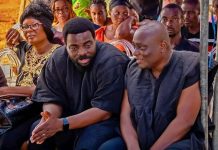Africa-Press – Ghana. Muanasa Alberto, 62 is a retired high school teacher from Palma District, Cabo Delgado, Northern Mozambique. One day and in a flash, the house she had built from her retirement gratuity was swept away by floods.
Her two younger brothers that had made a name from fishing died from the swelling Indian Ocean.
However and most painful for Imani is that in the process of escaping the raging floods while carry her elderly mother on her back she momentarily relapsed in concentration allowing her mother slip from her hands into the rapidly flowing water. The loss from climate-related Cyclone Idai is too much and painful that Imani could not wail while narrating her story to an international audience attending a conference on Loss and Damage holding Lilongwe in Malawi.
Muanasa’s story brings to the fore the issues for Africans to demand for compensation on loss and damage from such climate triggered disasters.
Ahead of the 27 Conference of Parties to the UN Framework Convention on Climate Change (COP27) to be held in Egypt later in the year, it is imperative that the African voices and priorities be well represented. The Malawi forum is providing us the opportunity to harness such voices,” said Philip Kilonzo, the Head of Policy, Advocacy and Communication at the PACJA.
Dr Olufunso Somoririni, Africa Development Bank said African countries should always use every opportunity to demand for compensation for loss and damage, and the 27 Conference of parties to the UN Framework Convention on Climate Change is one such chance.
The Africa Development Bank is supportive of processes that support varied ways of documenting and packaging community evidence on loss and damage as evidence for negotiation in UNFCCC process, he added.
He added that those who were affected by climate change are supposed to be compensated which means that African countries need a lot of finances to support the victims even as efforts by CSOs continue to support and promote resilience.
Rafa Valente Machava from Mozambique, the CSOs and governments have to be careful when talking about compensating for loss and damage.
She noted that it is very difficult to compensate someone who has lost everything including lives of relatives. “There is need to come up with proper mechanisms to curb the impact of climate change to avoid such deaths and suggested that Africa countries should work together by coming up with long lasting solutions,” she said. She decried the levels of corruption in Africa which she noted always end up defrauding victims no matter the policies set.
For the Baringo residents, things have refused to return to normal since the floods that took place in 2017. Majority of the residents of Marigat are still in IDP camps since the floods cleared off their livelihoods.
Schools still remain closed, water-borne diseases have increased since the Lake Baringo and Bogoria swelled into human settlements and swamped both community land and public infrastructures providing social services such as health centres and schools. The tourism that used to flourish as a result of the tourist attraction site of Hot springs and agriculture related activities including the famous Goat Auctioning have collapsed.
According to Roseline Tangule Leiro, from Barinogo, Kenya, there are some within emergency response teams that are fooling residents. “Residents were shocked to later learn that they were to pay rent for tents they were given to settle in following the floods. Families are losing property, particularly land since the floods swept off beacons and property shirks anticipate water receding and have gone ahead to survey water-logged swampy areas. We have no alternative land.”
She adds “Access to clean water, sanitation and hygienic environment is no longer tenable and the rights of the IDPs are being violated when climate disasters happen,”
Fatness Tchuzi, from Chiwawa District of Malawi a survivor from the floods said the community cannot be moved to another place since their rights to land partly lay on the claim that their ancestors are buried there. “Even if the government transfers the member of the community to another place, this will be a precursor to future conflicts with the owners of the new place who, like her own Chiwawa community also lay claim to rights to the land as a result of their dead relatives who are buried in those lands,”, she said.
In addition, she said her community is a fishing community who often get attracted to the village wherever it rains because that is the time they expect to harvest fish. “It is incumbent upon the government to manage floods. We do not go back to the land with the intention of getting killed by floods. We go there when it rains because that is the time for planting and fishing,” she noted.
Robert Muthami, Progamme Coordinator, Fredrich Ebert Stiftung noted that much need to be done around providing needed expertise and guidance to governments on framing loss and damage given the inertia at the UN Framework Convention on Climate Change discussion processes. But this will need harmonized research from all players.
CSOs and governments need to be working closely with the people in communities because most of the issues of loss of damage come from there. We must stop pretending to be working with the communities but actively seek to listen what they are saying, while building on their cultural norms that guide decisions they make.
Yared Abera from World Resources Institute adds that developed countries are supposed to show solidarity to the Africa and other developing countries because the issue of loss of lives that comes from climate change impacts cannot be economic.
For More News And Analysis About Ghana Follow Africa-Press







